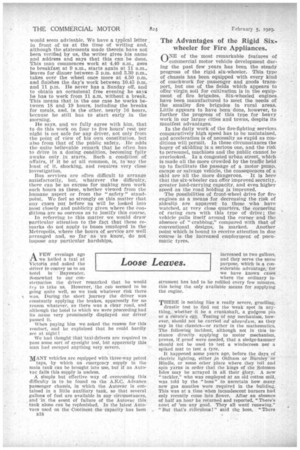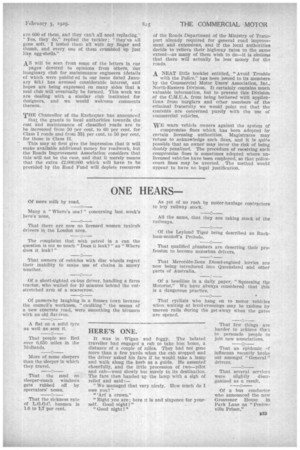A FEW evenings ago IA we bailed a taxi at
Page 2

Page 3

If you've noticed an error in this article please click here to report it so we can fix it.
Victoria and asked the driver to convey us to an lintel in Bayswater. somewhat to our consternation the driver remarked that he would /.// to take us. _ However, the cab seemed to be going quite well, so we took whatever risk there was. During the short journey the driver was constantly applying the brakes, apparently for no reason whatever, as there was a clear road, and although the hotel to which we were proceeding had its .name very prominently displayed our driver passed it.
When paying him we asked the reason for lids conduct, and he explained that be could hardly see at night
We had thought that 'taxi-drivers are required to pass some sort of eyesight test, but apparently this maa had escaped anything very severe.
.
MANY vehicles are equipped with three-way petrol taps, by which an emergency . supply in the main tank can be brought into use, but if an Autovac fails this supply is useless.
A simple but effective way of overcoming this difficulty is to be found on the A.E.C. Advance passenger chassis, in which the Autovac is contained in a little auxiliary tank, so that several. gallons of fuel are available in any circumstances, and In. the. event of failure of the Aumvac this tank alone can be replenished. In the latest Autovacs used on the Continent the capacity has been
B18
increased to two gallons, and they serve the same • purpose, which is a considerable advantage, for we have known cases where the ordinary instrument has had to be refilled every few minutes, this being the only available means for supplying the engine.
THERE is nothing like a really severe, gruelling,
drastic test to find out the weak spot in anything, whether it be a crankshaft, a gudgeon pin or a curate's egg. Testing of any mechanism, however, should not be carried ad absurduni, as they say in the classics--or rather in the mathematics. The following incident, although not in this instance directly applying to motor mechanism, proves, if proof were needed, that a sledge-hammer should not be used to test a windscreen nor a spiked mat to test a tyre.
It happened some years ago, before the days of electric lighting, either in Oldham or Burnley or Hindle, or some other place where they toil and spin yarns in order that the kings of the Solomon Isles may be arrayed in all their glory. A new "tackler," who was employed at an old cotton mill, was told by the " boss" to ascertain how many new gas mantles were required in the building. This was at a time when incandescent burners had only recently come into Bower. After an absence of half an hour he returned and reported, "There's nowt of 'em any good. They all want renewing." "But that's ridiculous!" said the boss, "There
are GOO of them, and they can't all need replacing." " Yes, they do," replied the tackler; "they've all gone soft. I tested them all with my finger and thumb, and every one of them crumbled up just like egg-shells."
AS will be seen from some of the letters in our pages devoted to opinions from Others, Our imaginary club for maintenance engineers (details of which were publisi ed in our issue dated January 8th) has aroused considerable interest, and hopes are being expressed on many sides that a real club will eventually be formed. This week we are dealing with a similar club instituted for designers, and we would welcome comments thereon.
THE Chancellor of the Exchequer has announced that the grants to local authorities towards the cost and maintenance of classified roads are to . be increased from 50 per cent. to 60 per cent. for Class I roads and from 33/ per cent. to 50 per cent. for those in Class TT.
This may at first give the impression that it will make available additional money for roadwork, but the Roads Improvement Association considers that this will not be the case, and that it merely means that the extra 12,000,000 which will have to be provided by the Road Fund will deplete resources of the Roads Department of the Ministry of Traneport already required for general road improvement and extensions, and if the local authorities decide to relieve their highway rates to the same extent—as many of them wish to do—it is obvious that there will actually be less money for the roads. •
A NEAT little booklet entitled, "Avoid Trouble
with the Police," has been issued to its members by the Commercial Motor Users' Association, Inc., North-Eastern Division. It certainly contains much valuable information, but to prevent this Division of the C.M.U.A. from being bothered with applications from burglars and other members of the criminal fraternity we would point out that the contents are concerned purely with the use of commercial vehicles.
WE warn vehicle owners against the system of compromise fines which has been adopted by certain licensing authorities. Magistrates may refuse to acknowledge such fines, and it is quite possible that an owner may incur the risk of being doubly penalized. The procedure of receiving such compromise fines is sometimes adopted where unlicensed vehicles have been employed, so that policecourt fines may be averted. , The method would appear to have no legal justification.


































